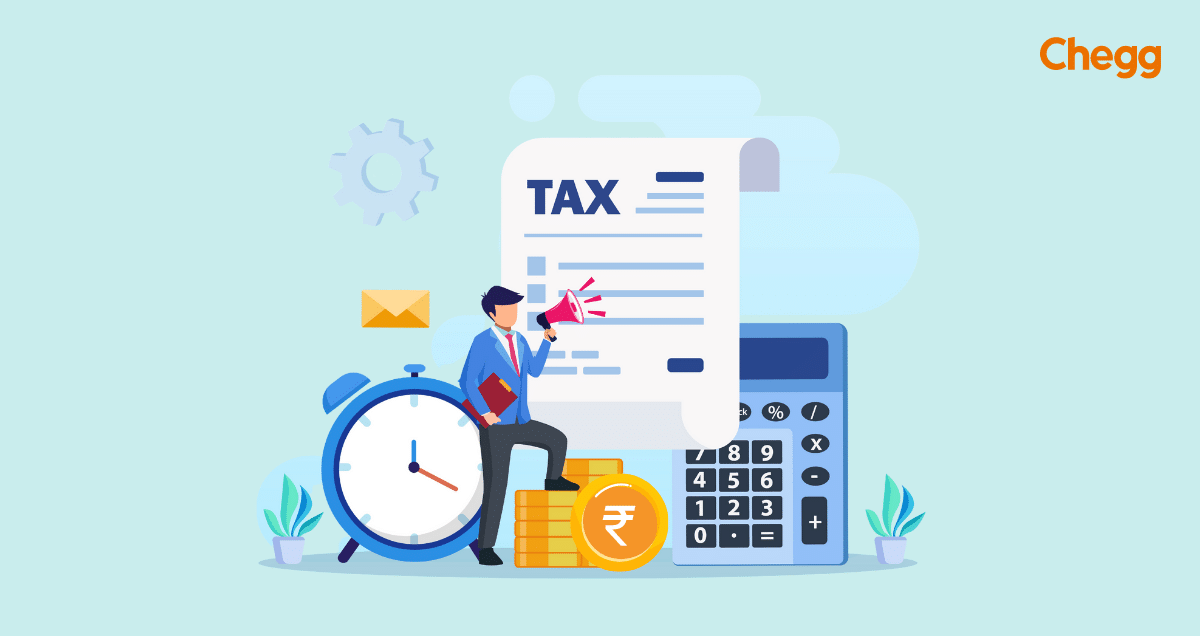

Quick Summary
“How to become a tax consultant” begins with understanding the role: tax consultants are professionals who do much more than just file taxes-they help individuals and businesses plan their finances strategically to reduce tax liability while staying compliant with complex tax regulations.
So, how do you become a tax consultant in India? The journey begins with a strong educational background in fields like accounting, finance, or law. Gaining specialized knowledge in taxation and pursuing certifications such as Chartered Accountant (CA) or other tax-specific qualifications is essential.
This guide provides aspiring tax consultants with practical steps and key insights to build a successful career in taxation in India..
A Tax Consultant is a financial expert who specializes in tax laws, regulations, and planning to help individuals, businesses, and organizations minimize their tax liabilities while ensuring full compliance with government policies. They provide strategic advice on tax-saving methods, filing returns, GST compliance, corporate taxation, and legal tax matters.
In addition to offering guidance on audits and deductions, tax consultants play a key role in financial planning and risk management-helping clients optimize tax benefits, stay updated with regulatory changes, and avoid legal penalties.

Now that we’ve defined who a tax consultant is, let’s explore their key responsibilities in India:
Tax consultants or tax advisors specialize in different areas of taxation. These professionals are crucial in helping individuals, and businesses understand tax laws and regulations. How to Become a Tax Consultant? To become a tax consultant in India, you need a solid educational foundation, typically in fields like accounting, finance, or law. Let’s explore the various types of tax consultants in India-
A Certified Public Accountant (CPA) is a licensed professional who offers accounting services to the public.
The IRS licenses enrolled agents (EAs) specializing in federal tax matters. They can represent individuals and businesses before any IRS office. How to Become a Tax Consultant? To become an EA, candidates must pass the Special Enrollment Examination covering various aspects of tax preparation and client representation. EAs must fulfill continuing education requirements to maintain their license. As a fresher, an Enrolled Agent can earn an annual salary of up to 10-12 lakhs. Becoming a tax consultant, including an Enrolled Agent (EA), requires a solid educational foundation in accounting, finance, or law.
Tax attorneys are like specialized lawyers with a license to help people with tax-related issues. They know a lot about tax laws, like planning for taxes, filling out tax forms, and giving advice on smart tax strategies. These lawyers can even represent people in front of the IRS. To stay up-to-date, they have to keep learning about new laws through ongoing education. The average monthly salary for a Tax Attorney in India is ₹31,276 (Salary Source: Glassdoor). To become a tax consultant, including a tax attorney, you’ll first need to pursue a law degree (LLB) and then specialize in tax law.
Non-credentialed tax preparers are individuals who prepare taxes without official certifications. They may work during tax season or volunteer to help people with their taxes. The IRS has a program called the Annual Filing Season Program for non-credentialed tax preparers. It involves taking courses to learn about federal tax laws. Some states have rules that require non-credentialed tax preparers to take tax education courses, but not all states have these requirements. The average annual salary for a Tax Preparer in India is ₹2.7 Lakhs (Salary Source: Ambitionbox). To become a tax consultant, including a tax preparer, you don’t always need formal credentials, but it is still important to gain a good understanding of tax laws and regulations.

Individuals can pursue various tax consultant certifications and qualifications and certifications, such as:
To establish a successful and rewarding career in tax consultancy, it is essential to cultivate a robust foundation of professional skills. These competencies not only enhance your ability to perform effectively but also position you as a reliable and knowledgeable expert in the industry. A Tax Consultant is expected to navigate complex financial regulations, advise clients on tax-saving strategies, and ensure compliance with ever-evolving tax laws. Therefore, honing the right skills is crucial for both career advancement and client satisfaction.
Below are some of the core skills and competencies that are vital for excelling in the field of tax consultancy:
Tax consultants must be adept at analyzing financial data and identifying practical solutions that help clients minimize tax liabilities effectively.
Staying updated with the latest tax regulations, compliance norms, and legal frameworks is vital to ensure accurate guidance and avoid costly errors.
Whether it’s drafting reports or explaining complex tax matters, tax consultants need clear and effective communication-both verbal and written-to interact with clients, legal authorities, and financial institutions.
Accuracy is non-negotiable in taxation. A minor error in calculations or documentation can lead to major consequences. Precision ensures proper filings and builds client trust.
Since tax consultants handle sensitive financial data, integrity and confidentiality are essential. Upholding ethical conduct fosters long-term credibility and client loyalty.
To achieve career growth in tax consultancy, it’s important to develop expertise in a specific area. Specializing allows you to build advanced knowledge and offer targeted, high-value services. Here are some key specializations within the field:
This specialization focuses on advising businesses and corporate entities. Consultants help companies optimize their tax liabilities, comply with regulations, and make financially sound decisions.
Consultants in this area work closely with individual clients, managing their tax filings, documentation, and providing guidance on financial planning and tax-saving strategies.
Experts in this field specialize in Goods and Services Tax (GST) and other forms of indirect taxation. Their services are particularly relevant to businesses, helping them remain compliant and efficient in managing these taxes.
This specialization involves advising clients on cross-border taxation matters. It is especially relevant for multinational companies and individuals with international income or investments.
Here are the 7 key steps on how to become a tax consultant in India:
Start by completing a bachelor’s degree in a relevant commerce, finance, or accounting field. A strong foundation in financial concepts and taxation will benefit your career as a tax consultant.
While pursuing your education, seek opportunities to gain practical experience in taxation. This can be achieved through internships, part-time jobs, or volunteering with accounting firms or tax departments of companies. Practical exposure will enhance your understanding of tax processes and regulations.
Depending on your career goals, clearing professional exams like the Chartered Accountancy (CA) or Cost and Management Accountancy (CMA) can be an important step. These certifications assess your skills in taxation, accounting, auditing, and financial management. Passing these exams not only proves your expertise but also boosts your career prospects in tax consultancy and finance. They require strong preparation and a deep understanding of financial concepts, making them valuable for those who want to offer expert advice and advance in the field.
Seek employment opportunities or internships with tax consulting firms, accounting firms, or the tax departments of companies to gain valuable experience.
In the world of tax consultancy, connecting with other professionals is important. By building a strong network of professional contacts, you can find new clients, job opportunities, and chances to work together with others.
Once you have acquired the necessary qualifications and experience, register with professional bodies such as ICAI or the Institute of Cost and Management Accountants of India (ICMAI). They add credibility to your profile and enable you to practice as a tax consultant.
Cultivate your expertise in specific areas of taxation, such as income tax, GST, or international taxation. Develop a niche and market your specialized skills through professional branding, online presence, and client referrals.
Building on the scope of a Tax Consultant’s career in India, here are the key roles and growth paths available in this field:
Graduates with a B.Com or M.Com degree from a recognized institution can start their careers in established accounting and tax consultancy firms.
With sufficient knowledge and relevant certifications, professionals can offer freelance tax consultancy services or establish their own consultancy businesses.
Tax Consultants are in demand in MNCs for managing complex and diverse tax obligations across regions and regulatory frameworks.
Positions are also available in government departments such as the Income Tax Department of India, offering stable career paths and public service opportunities.
In summary, a degree in commerce opens doors to a career in public accounting or corporate taxation. With experience and continuous upskilling, professionals can progress to senior advisory roles or launch their own consultancy practice, working with national and international clients.
A tax consultant’s salary range varies based on experience, qualifications, and the clients’ complexity. The average salary for a tax consultant in India demonstrates the value placed on their services and the opportunities available in this rewarding field. The average salary for a Tax Consultant is 6.6 LPA (Salary Source: Glassdoor). To become consultant you’ll need a strong educational background, typically in accounting, finance, or law. A bachelor’s degree in these fields is a good starting point.

Salaries for Tax Consultants vary based on their experience level:
An average total compensation of ₹536,082 can be expected for Tax Consultants with less than 1 year of experience.
A tax consultant with 1-4 years of experience can earn an average total compensation of ₹565,763.
Tax Consultants with 5-9 years of experience earn an average total compensation of ₹663,278.
Tax Consultants with 10-19 years of experience earn an average compensation of ₹650,000.
Consultants with 20 years or more experience earn an average compensation of ₹605,048.
Salary Source: Glassdoor
As the level of experience increases, so does the average salary for Tax Consultants. This reflects the growth in expertise and knowledge gained over the years and the increased responsibilities and value brought to the role.
This Guide covered How to become a tax consultant. Becoming a tax consultant offers an exciting and rewarding career path in finance. With the right qualifications, skills, and experience, aspiring tax consultants can thrive in this ever-evolving industry. If you are considering a career as a tax consultant, you are entering a field that offers exciting opportunities and challenges.
It is a profession that requires a strong understanding of tax laws and regulations and excellent analytical and communication skills. Following our comprehensive guide, you can embark on a path of how to become a tax consultant. Remember to focus on your education, gain practical experience, and stay updated with the latest tax laws. Hard work, dedication, and a passion for numbers will be your keys to success. Embrace the journey, keep learning, and get ready to become a trusted advisor in the ever-evolving world of taxes.
Evaluate numerous career choices to choose the right career path for yourself. Dive into our guide on Career Advice.
To become a tax consultant in the UK, typically the following qualifications are required:
A degree in finance, accounting, or a related field.
Professional qualification such as ACA, ACCA, or CTA.
Relevant work experience in tax advisory or accounting roles.
Strong understanding of UK tax laws and regulations.
Starting as a tax consultant involves:
1. Obtaining the necessary education and certifications.
2. Gaining practical experience through internships or entry-level positions.
3. Building a solid professional network.
You can also start offering consulting services to clients by joining firms or independently. It is equally important to network with people in your field to enhance your knowledge and for better opportunities.
Yes, a tax consultant can be a good career in India, offering strong job prospects, opportunities for growth, and the potential for a lucrative income.
The best degree for a tax consultant depends on personal interests and career goals. Pursuing a Bachelor’s degree in Commerce (B.Com) with a specialization in Taxation or a Bachelor’s degree in Business Administration (BBA) with a focus on Accounting and Finance can be a good starting point. Advanced degrees like a Master’s in Business Administration (MBA) or specialized certifications like CPA or EA can further enhance career prospects.
To become a Tax Consultant in India, a degree in Commerce, Accounting, Finance, or Law (e.g., B.Com, CA, CS, LLB) is preferred. Professional certifications like CA, CMA, or specialized taxation courses add value. Practical experience in tax filing, GST, and financial planning is essential, and registration with relevant tax authorities may be required.
Yes, you can become a tax consultant without being a Chartered Accountant by gaining relevant qualifications, such as a degree in commerce, law, or completing a tax-related certification course. Practical experience and knowledge of tax laws are key.
A degree in Accounting, Finance, or Taxation is best for a tax consultant.

Authored by, Gagandeep Khokhar
Career Guidance Expert
Gagandeep is a content writer and strategist focused on creating high-performing, SEO-driven content that bridges the gap between learners and institutions. He crafts compelling narratives across blogs, landing pages, and email campaigns to drive engagement and build trust.
Editor's Recommendations
Chegg India does not ask for money to offer any opportunity with the company. We request you to be vigilant before sharing your personal and financial information with any third party. Beware of fraudulent activities claiming affiliation with our company and promising monetary rewards or benefits. Chegg India shall not be responsible for any losses resulting from such activities.
Chegg India does not ask for money to offer any opportunity with the company. We request you to be vigilant before sharing your personal and financial information with any third party. Beware of fraudulent activities claiming affiliation with our company and promising monetary rewards or benefits. Chegg India shall not be responsible for any losses resulting from such activities.